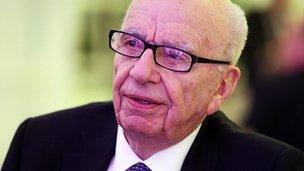Eye of the storm
- Published
- comments

Rupert Murdoch flies into London facing the biggest crisis of his career, as the fallout from the News of the World phone-hacking scandal spreads to his other UK newspapers, amid talk of "civil war" between parts of his empire.
A lifelong newspaperman, he has already faced the personal and corporate disaster of closing Britain's biggest-selling paper, after a revolt by readers and advertisers over its hacking of Milly Dowler's phone messages.
Now he faces open revolt from journalists on the Sun, the paper which laid the foundations of his media empire with its "soaraway" success in the 1970s. Nine of the paper's most senior staff have been arrested in recent weeks on the basis of information supplied by their parent company in the United States, where sources have been quoted saying they are "draining the swamp".
Staff at the Sun are furious - and fearful - at the way the Management and Standards Committee (MSC) of the parent group, News Corp, has given the police apparently incriminating evidence about its own journalists and their alleged sources. In his column, the paper's former political editor Trevor Kavanagh - long regarded as a close confidant of Murdoch - expressed concern at the management's actions. He told the BBC there was particular unhappiness that parts of the company were boasting that it was their information that had put journalists into police cells.
The revolt has spread to The Times - into which Murdoch has poured hundreds of millions of pounds over the years to cover its losses. It was The Times which reported that the MSC had disclosed the identity of police officers, a civil servant and an army officer to Scotland Yard because it did not believe they were "legitimate sources", since they had allegedly been paid for information.
The Times followed this up with a column by the human rights lawyer Geoffrey Robertson, headed 'Protecting sources is a legal and moral duty'. He wrote: "Not all payments to public officials for information are regarded, in practice, or in law, as contrary to the 1906 Prevention of Corruption Act, especially now that Article 10 of the Human Rights Act requires the public interest of disclosure to be taken into account," he wrote. He said the Daily Telegraph had not been prosecuted for paying a large sum of money to acquire details of MPs' expenses
Now staff are talking to the National Union of Journalists about preparing a possible legal challenge to their own company's actions, on the grounds that they are ethically and legally obliged to protect their sources, under the editors' code overseen by the PCC.
Amid all this, there are still fears for the paper's long-term future. Staff will seek further assurances this week after News International's chief executive Tom Mockridge told them he'd had a "personal assurance from Rupert Murdoch about his total commitment to continue to own and publish The Sun". Unlike the News of the World, the Sun has not yet lost the support of the public or advertisers.
Meanwhile, as Rupert Murdoch flies to London, one of his main protagonists is flying the other way to the United States. Mark Lewis, the solicitor who represents several of the phone-hacking victims, is meeting lawyers to see whether they can continue their legal battle in the United States. That is exactly what News Corp - by co-operating so fully and openly with the police - has been trying to avoid.